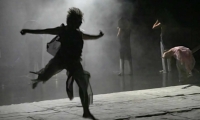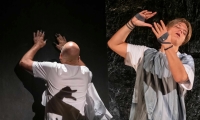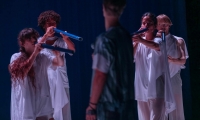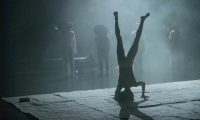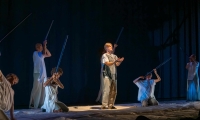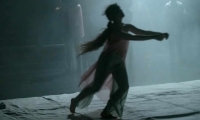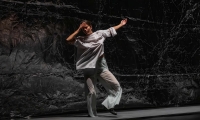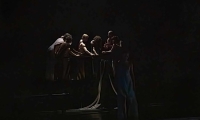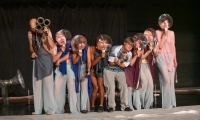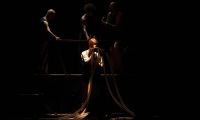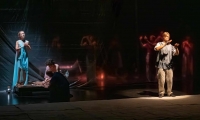Cast
Concept, direction and set design
Eva Reiter, Michiel Vandevelde
Music composition, electronics
Eva Reiter
Choreography, lights
Michiel Vandevelde
Narrator
Ruben Grandits
Soprano
Lore Binon
or Maris Pajuste, in Brugge on March 26
Dancers
Amanda Barrio Charmelo
Nathan Felix-Rivot
Antoine Roux-Briffaud
Aure Wachter
Musicians
Dirk Descheemaeker
Hanna Kölbel (or Lucas Messler in Hamburg)
Eva Reiter
Michael Schmid
Costumes
Tutia Schaad
IRCAM computer music design
Augustin Muller
Sound
Alexandre Fostier
assisted by
Antoine Delagoutte
(or Vincent Debongnie,
in Brugge and Hamburg)
Outside eye
Kristof van Baarle
Translation into International Sign
and original poetry sign
Günter Roiss, Georg Marsh, Ruben Grandits, Stefanie Fieber-Grandits, Eva Reiter
Technical director Pieter Nys
Light operator Freek Pieters
Set design assistance Daniella Khoury
Design backdrop four Ward Heirwegh
Costume assistance Jette Dresbach
Production
Production
Ictus Ensemble
Disagree. vzw
Co-production
Musica Festival Strasbourg
ElbPhilharmonie Hamburg
Concertgebouw Brugge
Ircam-Centre Pompidou
Perpodium
KWP (in Pianofabriek)
With the support of
Flemish Community
The Tax Shelter of the
Belgian Federal Government
Eva Reiter's music commissioned by Ictus
is funded by Ernst Von Siemens Musikstiftung

With the financial support from the Österreichisches Kulturforum

© Bea Borgers
© Bea Borgers
© Bea Borgers
© Bea Borgers
© Bea Borgers
© Bea Borgers
© Bea Borgers
© Bea Borgers
© Bea Borgers
© Bea Borgers
This plunge into hell is not just about communication between the living and the dead. It provokes a quality in the audience of extreme listening. And you emerge from it more attuned to the noise of the world (...) Not to be missed
Baudouin Eschapasse, Le Point, 30/09/2024

Who can say what the world is? The world
is in flux, therefore
unreadable, the winds shifting,
the great plates invisibly shifting and changing—
Louise Glück, Averno

Many worlds exist, and more are yet to come. In The Rise, musical bodies, dancing bodies, singing bodies, create a new world from a series of poems by Louise Glück, Averno. The master of ceremonies is Ruben Grandits, a deaf actor, a wizard of translation, who circulates meaning between language, sign and sound. He guides the ten performers through the mouth of the volcano Averno, which is also the place of passage between the world of the living and the world of the dead. Before our eyes are then reinvented: new instruments, new musical harmonies, and a grammar, a rhetoric, even a politics.

In The Rise, composer Eva Reiter and choreographer Michiel Vandevelde focus on the coexistence and interchanges of various worlds as they unfold on stage successively. Thereby it is the process of translation that lead to the emergence of such new worlds. Throughout translating and re-contextualizing symbols, signs, gestures and sounds, new languages are created that eventually transform our perspective on a particular world.
At the centre of the piece appears Ruben Grandits, a young deaf performer who is the only person – although non-hearing – that is capable of transmitting the story to the public. His hands are equipped with sensors and therefore his movements are directly translated into sound. His signs, when speaking to us, serve as basic source for the world of sound and movement. Vice versa music is translated back into visual signs, making the piece also accessible to deaf people. The Rise focusses on echoes and mediation. It exemplifies modes of communication in which mediation can’t and shall not be avoided.
The Rise is based on the poetry of Nobel prize winner Louise Glück. Specifically her publication Averno serves as the main material for the libretto. Averno, a crater lake in Italy, was believed to be the entrance gate to the underworld. In her poetry Glück connects and interchanges the two worlds of the living and the dead, returning from one to another and evokes images of life and death, of eternity and the profane. Similarly to the surface of the lake which serves as a permeable membrane into that parallel world, we will create parallel and intermediate worlds throughout the way these poems are performed.
Throughout the entire work we neither see nor hear any traditional musical instrument, but only newly constructed, self-developed ones that form the basis of the score and stage set. All instruments were developed with the aim to translate movement into sound directly—sometimes collectively. The ensemble consists of four dancers, four musicians, one singer and the narrator, forming an „homogeneous“ group with echoed material. All together they additionally form a „choir“, which takes on a decisive function in its collective role and increasingly stages itself as a new community.
Throughout echoing musical information to sign language – throughout mediating meaning in that sense – there are various ways to read and to access this work. The inability to understand individual aspects doesn’t represent a deficiency and does not need to be compensated, it rather represents the various points of views out of which we generate understanding.
This plunge into hell is not just about communication between the living and the dead. It provokes a quality in the audience of extreme listening. And you emerge from it more attuned to the noise of the world (...) Not to be missed
Baudouin Eschapasse, Le Point, 30/09/2024

Wie kan zeggen wat de wereld is? De wereld
is in beweging, en dus
onleesbaar, de omlopende wind,
de verschuivende, onzichtbaar veranderende platen
Louise Glück, Averno

Er bestaan vele werelden - en er komen er steeds meer bij. In The Rise creëren muzikale lichamen, dansende lichamen, zingende lichamen een nieuwe wereld, op basis van een reeks gedichten van Louise Glück, Averno. De ceremoniemeester is Ruben Grandits, een dove acteur en vertaaltovenaar die betekenis laat vloeien rond taal, gebaar en geluid. Hij gidst de tien performers door de mond van de vulkaan Averno, die ook dienstdoet als portaal tussen de wereld van de levenden en de wereld der doden. Worden dan voor onze eigenste ogen uitgevonden: nieuwe instrumenten, nieuwe harmonieën, een grammatica, een retoriek en zelfs een politiek.

In The Rise richten componist Eva Reiter en choreograaf Michiel Vandevelde zich op de verschillende werelden die naast elkaar bestaan, die elkaar afwisselen en zich achtereenvolgens op het podium ontvouwen. Het is dankzij vertaling dat dergelijke nieuwe werelden het levenslicht zien. Door symbolen, tekens, gebaren en geluiden te vertalen en te hercontexualiseren, worden nieuwe talen gecreëerd en wordt ons perspectief op een bepaalde wereld volledig getransformeerd.
Ruben Grandits staat centraal in het stuk. Deze jonge performer is doof, maar toch de enige persoon die in staat is om het verhaal op het publiek over te brengen. Zijn handen zijn uitgerust met sensoren - zijn gebaren worden automatisch omgezet in geluid. Als hij aan de hand van gebaren met ons praat, dienen die als fundament voor een wereld vol geluid en beweging. Omgekeerd wordt muziek weer vertaald naar visuele gebaren, waardoor het stuk ook toegankelijk is voor doven. The Rise heeft een focus op echo's en bemiddeling. Het stuk dient tot voorbeeld van communicatiemiddelen waarin bemiddeling niet kan - en niet zal - worden vermeden.
The Rise is gebaseerd op de poëzie van Nobelprijswinnaar Louise Glück, met name haar publicatie Averno, die het vertrekpunt vormt voor het libretto. Averno is een kratermeer in Italië en werd in de oudheid gezien als de toegangspoort tot de onderwereld. In haar gedichten verbindt Glück de wereld van de levenden met die van de doden, en laat ze beide in wisselwerking treden met elkaar. Door van de ene wereld in de andere te stappen, worden beelden opgeroepen van leven en dood, van de eeuwigheid en het wereldse. Net zoals het oppervlak van het meer een soort doorlaatbaar membraan is, dat leidt naar dat parallelle universum, creëren we parallelle en tussenliggende werelden aan de hand van de manier waarop deze gedichten worden opgevoerd.
Doorheen het hele werk kunnen we geen traditionele muziekinstrumenten zien of horen - alleen nieuwe, zelfgebouwde instrumenten vormen het skelet van de muziek en het decor. Alle instrumenten werden bedacht met het idee dat beweging rechtstreeks in geluid zou worden omgezet - soms collectief. Het ensemble bestaat uit vier dansers, vier muzikanten, een zanger en de verteller, die samen een 'homogene' groep vormen met echoënd materiaal. Samen vormen ze bovendien een ‘koor’, dat een beslissende functie vervult in zijn collectieve rol, en op het podium steeds meer de vorm aanneemt van een nieuwe gemeenschap. Terwijl muzikale informatie wordt weergalmd in gebarentaal - in die zin van bemiddeling - zijn er verschillende manieren om dit werk te interpreteren en in zich op te nemen. Een onvermogen om individuele aspecten te begrijpen is geen tekortkoming en hoeft niet te worden gecompenseerd! In tegendeel: het vertegenwoordigt de verschillende gezichtspunten van waaruit we ons begrip kunnen puren.
Cette plongée en enfer ne met pas seulement en communication les vivants et les morts. Elle provoque, dans le public, une qualité d'écoute extrême. Et l'on ressort de là plus attentif au bruit du monde (...) à ne pas manquer.
Baudouin Eschapasse, Le Point, 30/09/2024

Qui peut dire ce qu’est le monde ? Le monde
est en flux, et par conséquent
illisible, les vents se mouvant,
les grandes plaques se mouvant et changeant imperceptiblement —
Louise Glück, Averno

De nombreux mondes existent, et bien d’autres sont à venir.
Dans The Rise, les corps qui jouent, les corps qui dansent et les corps qui chantent font émerger un nouveau monde à partir d'une série de poèmes de Louise Glück, Averno. Le maître de cérémonie est Ruben Grandits, un acteur sourd, magicien de la traduction, qui fait circuler le sens entre la langue, le signe et le son. Il guide les dix interprètes à travers la bouche du volcan Averno, lieu de passage entre le monde des vivants et celui des morts. Se réinventent alors sous nos yeux : de nouveaux instruments, de nouvelles harmonies, une grammaire, une rhétorique, et même une politique.

Dans The Rise, la compositrice Eva Reiter et le chorégraphe Michiel Vandevelde travaillent sur la coexistence possible et les échanges entre différents mondes, qui se déploient successivement sur scène. C'est le processus de traduction qui conduit à l'émergence de ces nouveaux mondes. En traduisant et en recontextualisant des symboles, des signes, des gestes et des sons, de nouveaux langages se mettent en forme, qui transforment nos perspectives.
Au centre de la pièce : Ruben Grandits, un jeune artiste sourd. Quoi qu’il n’entende pas, il est le seul humain capable de transmettre l'histoire au public. Ses mains sont équipées de capteurs et ses mouvements sont directement traduits en sons. Losqu'il s’adresse à nous, ses signes servent de source pour générer tout un monde de son et de mouvement. Et vice versa : la musique est re-traduite en signes visuels (ce qui rend la pièce accessible aux personnes sourdes). The Rise se concentre sur les échos et la médiation. Il expose des modes de communication qui ne seraient tout simplement rien sans médiation.
The Rise s'inspire de la poésie de Louise Glück, prix Nobel 2020. Son recueil de poèmes Averno sert de matériau principal au livret. Averno, un lac volcanique italien, était jadis considéré comme Porte vers le monde souterrain. Dans son poème, Glück convoque des images de vie et de mort, entremêlant le monde profane au principe d’éternité. La surface du lac agit comme une membrane perméable, qui met en communication les mondes parallèles ; notre traitement des poèmes de Glück aura le même usage.
Tout au long de l'œuvre, nous ne voyons ni n'entendons aucun instrument de musique traditionnel, mais uniquement des instruments spécialement construits et développés par nos soins, qui constituent la base de la partition et du dispositif scénique. Tous les instruments ont été développés dans le but de traduire directement le mouvement en son, parfois collectivement. L'ensemble se compose du narrateur, de quatre danseur·euses, quatre musicien·nes et une chanteuse, qui forment un collectif homogène. Elles et ils travaillent un matériel qui se développe en écho. Tous ensemble, ils forment en outre un « chœur », dont le rôle collectif est crucial. Ce chœur finit par émerger comme « nouvelle communauté ».
L'écho mutuel des informations musicales et du langage des signes, toute cette circulation du sens, permet d'accéder à l’œuvre de différentes manières. L'impossibilité d’en comprendre certains points de vue ne sera pas vécu comme déficience, et n'aura pas besoin d'être compensée. The Rise en appelle à la multiplicité des perspectives, à partir desquelles se construit la compréhension.
Agenda for this project
- Date Show Location
-
Fri 20.09 The Rise Ircam at Centre Pompidou - Paris - France
-
Sat 21.09 The Rise Ircam at Centre Pompidou - Paris - France
- Date Show Location
-
Tue 01.10 The Rise Festival Musica - Strasbourg - France
-
Wed 02.10 The Rise Festival Musica - Strasbourg - France
- Date Show Location
-
Wed 26.03 The Rise Concertgebouw - Brugge - Belgium
-
Sat 29.03 The Rise Kaaitheater & Klarafestival - Brussels - Belgium
-
Sun 30.03 The Rise Kaaitheater & Klarafestival - Brussels - Belgium
- Date Show Location
-
Wed 17.09 The Rise Musiktheatertage - Wien - Austria

